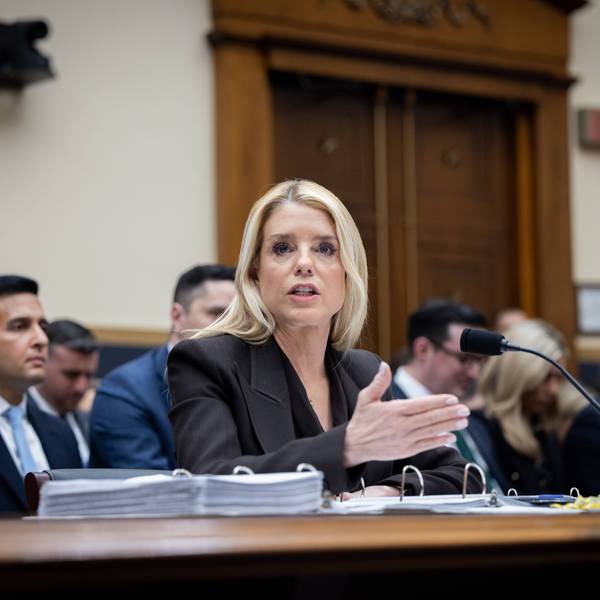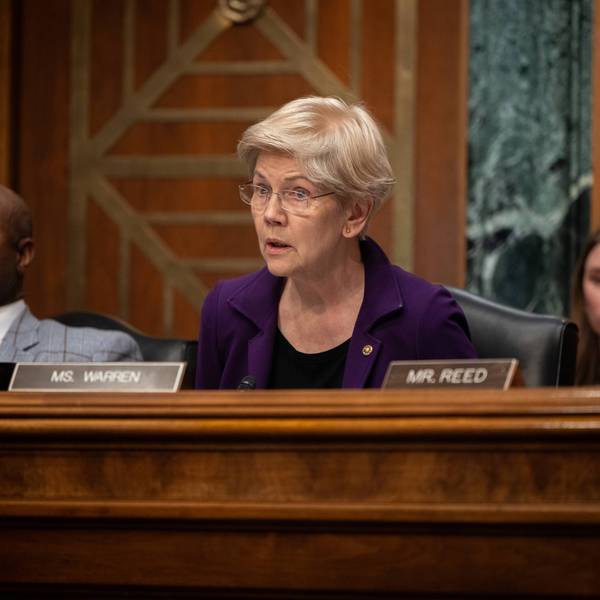'Counter to Public Good': Sanders Urges DOJ to Reject AT&T-Time Warner Deal
Merger will 'shrink our media landscape, stifle competition and diversity of content, and provide consumers with less while charging them more'
Sen. Bernie Sanders (I-Vt.) on Wednesday urged the U.S. Department of Justice to block the proposed AT&T-Time Warner merger, citing the widespread warnings against creating such media empires.
In a letter to the department's antitrust division, Sanders wrote, "This proposed merger is just the latest effort to shrink our media landscape, stifle competition and diversity of content, and provide consumers with less while charging them more."
"This merger represents a gross concentration of power that runs counter to the public good and should be blocked," he said.
News of the potential $85.4 billion acquisition emerged over the weekend, and media watchdogs and democracy groups like Free Press and Common Cause immediately issued warnings against it and urged federal regulators to reject it.

Opponents noted that previous mega-mergers have offset costs of the deals at their customers' expense, notably by charging more for services and implementing data caps, among other measures. And by consolidating a significant amount of media power--Time Warner owns CNN, HBO, and Warner Brothers, among other properties--the merger could discriminate against competitors and harm media diversity.
"Further entrenching monopoly harms innovation and drives up prices for consumers," Common Cause special adviser Michael Copps said on Monday.
Free Press policy director Matt Wood also cautioned, "Big mergers like this inevitably mean higher prices for real people, to pay down the money borrowed to finance these deals and their golden parachutes."
Sanders' letter continued, "The diversity of programing would be further diminished by truncating the relationship of content and distribution. When one giant company owns both the content and the means of distribution, there is a clear disincentive to provide additional choices to consumers."
"The media and telecommunications landscape is changing. It is important that public policy concerns guide these changes, so that we may preserve our democratic discourse and open competitive markets for speech and commerce," he said.
An Urgent Message From Our Co-Founder
Dear Common Dreams reader, The U.S. is on a fast track to authoritarianism like nothing I've ever seen. Meanwhile, corporate news outlets are utterly capitulating to Trump, twisting their coverage to avoid drawing his ire while lining up to stuff cash in his pockets. That's why I believe that Common Dreams is doing the best and most consequential reporting that we've ever done. Our small but mighty team is a progressive reporting powerhouse, covering the news every day that the corporate media never will. Our mission has always been simple: To inform. To inspire. And to ignite change for the common good. Now here's the key piece that I want all our readers to understand: None of this would be possible without your financial support. That's not just some fundraising cliche. It's the absolute and literal truth. We don't accept corporate advertising and never will. We don't have a paywall because we don't think people should be blocked from critical news based on their ability to pay. Everything we do is funded by the donations of readers like you. Will you donate now to help power the nonprofit, independent reporting of Common Dreams? Thank you for being a vital member of our community. Together, we can keep independent journalism alive when it’s needed most. - Craig Brown, Co-founder |
Sen. Bernie Sanders (I-Vt.) on Wednesday urged the U.S. Department of Justice to block the proposed AT&T-Time Warner merger, citing the widespread warnings against creating such media empires.
In a letter to the department's antitrust division, Sanders wrote, "This proposed merger is just the latest effort to shrink our media landscape, stifle competition and diversity of content, and provide consumers with less while charging them more."
"This merger represents a gross concentration of power that runs counter to the public good and should be blocked," he said.
News of the potential $85.4 billion acquisition emerged over the weekend, and media watchdogs and democracy groups like Free Press and Common Cause immediately issued warnings against it and urged federal regulators to reject it.

Opponents noted that previous mega-mergers have offset costs of the deals at their customers' expense, notably by charging more for services and implementing data caps, among other measures. And by consolidating a significant amount of media power--Time Warner owns CNN, HBO, and Warner Brothers, among other properties--the merger could discriminate against competitors and harm media diversity.
"Further entrenching monopoly harms innovation and drives up prices for consumers," Common Cause special adviser Michael Copps said on Monday.
Free Press policy director Matt Wood also cautioned, "Big mergers like this inevitably mean higher prices for real people, to pay down the money borrowed to finance these deals and their golden parachutes."
Sanders' letter continued, "The diversity of programing would be further diminished by truncating the relationship of content and distribution. When one giant company owns both the content and the means of distribution, there is a clear disincentive to provide additional choices to consumers."
"The media and telecommunications landscape is changing. It is important that public policy concerns guide these changes, so that we may preserve our democratic discourse and open competitive markets for speech and commerce," he said.
Sen. Bernie Sanders (I-Vt.) on Wednesday urged the U.S. Department of Justice to block the proposed AT&T-Time Warner merger, citing the widespread warnings against creating such media empires.
In a letter to the department's antitrust division, Sanders wrote, "This proposed merger is just the latest effort to shrink our media landscape, stifle competition and diversity of content, and provide consumers with less while charging them more."
"This merger represents a gross concentration of power that runs counter to the public good and should be blocked," he said.
News of the potential $85.4 billion acquisition emerged over the weekend, and media watchdogs and democracy groups like Free Press and Common Cause immediately issued warnings against it and urged federal regulators to reject it.

Opponents noted that previous mega-mergers have offset costs of the deals at their customers' expense, notably by charging more for services and implementing data caps, among other measures. And by consolidating a significant amount of media power--Time Warner owns CNN, HBO, and Warner Brothers, among other properties--the merger could discriminate against competitors and harm media diversity.
"Further entrenching monopoly harms innovation and drives up prices for consumers," Common Cause special adviser Michael Copps said on Monday.
Free Press policy director Matt Wood also cautioned, "Big mergers like this inevitably mean higher prices for real people, to pay down the money borrowed to finance these deals and their golden parachutes."
Sanders' letter continued, "The diversity of programing would be further diminished by truncating the relationship of content and distribution. When one giant company owns both the content and the means of distribution, there is a clear disincentive to provide additional choices to consumers."
"The media and telecommunications landscape is changing. It is important that public policy concerns guide these changes, so that we may preserve our democratic discourse and open competitive markets for speech and commerce," he said.

